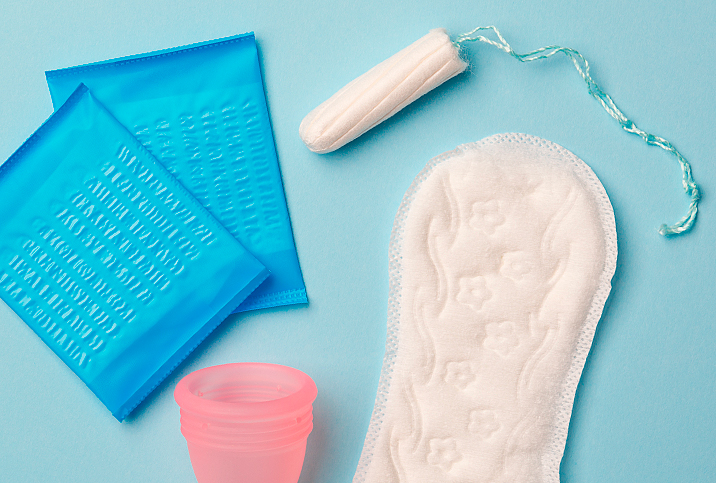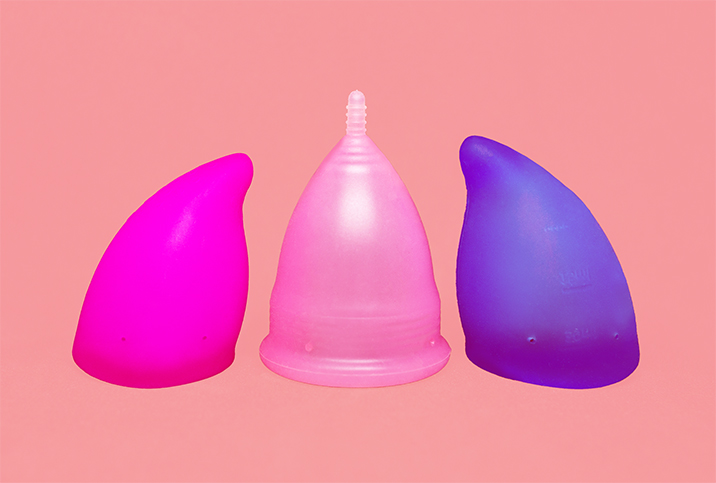The Fight Against the Tampon Tax

Kenya was the first country to eliminate the sales taxes on menstrual products in 2004, followed by the United Kingdom in 2015. India, Colombia, South Africa and Australia abolished the tax in 2018.
In the United States, there's no federal sales tax on menstrual products, however many states charge sales tax on period items. This sales tax is often referred to as the tampon tax, which isn't an accurate term, as sales tax is applied to all menstrual products, including but not limited to tampons.
Items deemed essential are exempt from sales tax. These products include groceries, such as flour, water, milk and eggs, dietary supplements regulated by the FDA, and certain print newspapers. These items differ by state. Products not deemed essential are taxable, and many people take issue with the categorization of menstrual products as nonessential.
"Most states charge sales tax on non-necessities and don't deem menstrual products to be a necessity," said Jennifer Weiss-Wolf, a lawyer, co-founder of Period Equity, and author of "Periods Gone Public."
Products not deemed essential are taxable, and many people take issue with the categorization of menstrual products as nonessential.
"Tampons, pads and cups are also essential to menstruators. Historically, the majority of the people making laws aren't menstruators," added Madeline Barrasso, M.P.H., program and grants manager at I Support the Girls. "Why are items like Viagra or chainsaws considered essential?"
The practice of taxing period products began nearly a century ago. "Period products are taxed because states began taxing personal property from the 1930s to the 1960s, and, even though they exempted medical necessities, they neglected to exempt period products," explained Laura Strausfeld, executive director of Period Equity.
Those excessive taxes quickly add up—it's estimated menstruators will spend around $17,000 during their lifetime on menstrual products (tampons, pads, panty liners, pain medication and underwear). Up to $225 of the total cost is tampon tax. And that's without considering state tax or those who use more costly organic products. (Some women with sensitive skin or other conditions may have to use unbleached, organic items.)
The additional expense from taxes is a financial burden to menstruating people needing monthly products for clean and safe menstruation. And beyond financial burden, the categorization of period products as nonessential is frustrating in principle to many individuals.
Tampon taxes across the nation
The Columbia Undergraduate Law Review states menstrual products shouldn't be considered luxury items but necessities for menstruators' livelihood. Yet, many U.S. states still require menstruators to pay taxes on products needed to care for their monthly cycle. Alaska, Delaware, Montana, New Hampshire and Oregon have no general sales tax, so there's no tampon tax.
Alabama and Tennessee have the highest tampon tax, at nearly 10 percent. Other states that tax menstrual products include Arizona, Arkansas, Colorado, Georgia, Hawaii, Idaho, Indiana, Iowa, Kansas, Kentucky, Mississippi, Missouri, Nebraska, New Mexico, North Carolina, North Dakota, Oklahoma, South Carolina, South Dakota, Texas, West Virginia and Wisconsin.
What's being done about it?

Wyoming is one of the states attempting to end taxation on period products. "A lawmaker voted against tampon tax repeal [in Wyoming] by arguing that if the state exempted feminine hygiene products, they should exempt male hygiene products, too," Strausfeld said. "Note the confusion caused by states continuing to refer to period products as 'hygiene' products."
Hygiene products typically include soaps, foot care, lotions, razors and other similar items. Lumping in menstrual products with this large array diminishes the necessity of products meant to aid women in their monthly cycle—a cycle they have no choice in or control over.
"There's legislative advocacy in nearly every state to pass laws and budgets that exempt menstrual products from sales tax," Weiss-Wolf said. Period Equity is organizing with local and state groups across the country with legal actions and lawsuits to support the fight against the tampon tax.
When Period Equity started advocacy efforts in 2015, 40 states didn't exempt menstrual products from sales tax. Since then, 13 states have passed laws or budgeted the exemption. Louisiana, Maine, Michigan, Vermont and Virginia were the latest states to eliminate the tax.
'The tampon tax is a form of sex-based discrimination and results in unequal treatment on the basis of sex.'
In 2016, Virginia House Delegate Mark L. Keam introduced the first legislation to repeal taxes on tampons and sanitary napkins. When Keam introduced House Bill 952, the Virginia Department of Taxation calculated the state would lose between $4 million and $5 million per year by eliminating taxes on certain menstrual products. (The tampon sales tax does increase state revenue, but Strausfeld noted eliminating the tampon tax would cost states less than .01 percent of their annual budget.)
Progress in Virginia has been slow but steady. "In 2019, we made progress by reducing the rate of the sales tax on these products to the same rate as groceries," Keam said. In 2020, the Virginia Senate unanimously agreed to eliminate the tax. The tax, however, wasn't officially removed until Governor Ralph Norton eliminated the tax in his outgoing budget in December 2021.
At the federal level, Representative Grace Meng's Menstrual Equity for All Act died in Congress without a vote in 2019, but the bill was reintroduced this year. "The act would allow states to use federal funds to provide free period products to students, incarcerated folks, those experiencing homelessness and others," Barrasso said.
Discriminatory taxing practices
"In some states, condoms—a gender-specific item to men—aren't taxed because they're essential. In those same states, period products are taxed," said Morgan King, co-founder of Orchyd, a period care company that partners with nonprofit Operation Period.
Some advocates say the tampon tax is not only sexist but unconstitutional, noting the tax violates the equal protection clause of the 14th Amendment of the U.S. Constitution by targeting a bodily function associated with women. "The tampon tax is a form of sex-based discrimination and results in unequal treatment on the basis of sex," Weiss-Wolf said.
Strausfeld explained further, "If the government taxed medical necessities only used by men, it would be considered a violation of the equal protection clause."
"'Women' and 'men' are protected classes under the constitution," Strausfeld continued, "so that any law that targets them has to be shown to 'substantially' further an 'important' government interest."
In the end, proponents of ending the tampon tax say they want to create equal opportunity for women to care for their health without enduring financial hardship.
"People who menstruate should have access to the period supplies they require to participate in daily life. Ending state sales taxes is one part of that equation," said Jennifer Gaines, program director for Alliance for Period Supplies. To join the fight, Gaines encourages folks to push forward legislation to eliminate these taxes.


















